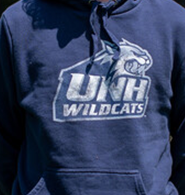Following the Thread of Sustainability in UNH Goods

Did you know that when you go to a store, or shop online for UNH goods, that the items offered to you for sale are part of the sustainable practices that UNH embraces as a community? Every time you see a wildcat head, pawprint, or the UNH shield on a t-shirt, umbrella, or coffee mug, that object got there through a rigorous process with UNH’s humane, sustainable values in mind. UNH’s brand identity, including names, designs, logos, and identifiable style is a portfolio of federally registered trademarks that help others clearly understand when a program, event, building, or object originated from UNH. Those trademarks mean that UNH has control over who can produce goods marked with UNH’s brand, in the same way that Coca-Cola and Nike trademarks protect their brand identity.
Since 2013, when UNH formalized its licensed products and trademark program, the university’s primary objective regarding branded goods has been responsible, ethical production. In other words, the university wants every Wildcat to feel good when buying something with the UNH brand on it. To achieve that goal of ethical production, UNHInnovation (UNHI) partnered with Collegiate Licensing Company (CLC), the most well-regarded collegiate licensing program in the United States, to ensure that the university could manage its producers throughout its entire supply chain, from the factory to the store. Through the partnership with CLC, UNHI monitors all of the companies that produce goods with the UNH brand for compliance. Those companies are called licensed vendors, or vendor partners. To become a partner with UNH, a company must agree (through a legally binding agreement) to use UNH’s brand correctly and uphold the university’s values, which include giving back to the community and a commitment to a sustainable workforce. All departments, groups, clubs, or other members of the UNH community that would like to produce UNH-branded goods are required to work with these vendor partners to ensure that UNH dollars are spent strictly on ethically produced branded goods. To date, UNH has nearly 150 vendor partners who produce a wide variety of goods for the UNH community and for the public at retail. To see all of UNH’s vendor partners, visit, https://clc.com/license-search/ and choose “University of New Hampshire” in the second drop-down.
Through our partnership with CLC, UNHI tracks our vendor partners’ participation in two mandatory commitments toward a sustainable workforce. The first is required membership in the Fair Labor Association (FLA), of which UNH is also a member. The Fair Labor Association is a “collaborative effort of companies, colleges and universities, and civil society organizations". Since 1999, FLA has been working to ensure that labor practices in factories across the globe are humane, just, and fair by tracking and monitoring global supply chains and educating members on best practices. They ensure that child labor, forced labor, and slave labor stay out of their members’ supply chains through a system of constant diligence and data vetting. FLA professionals go to the sites of labor across the globe to encourage worker/owner dialogues toward remediation, improved working conditions and wages, and to make sure that these conditions continue to meet international standards of human rights. When data vetting in their supply chain analysis becomes blocked or incomplete, the FLA advises its members to increase diligence on their licensees in those regions, or in some egregious cases, to remove supply chains from those areas entirely. Over the years, the FLA has dramatically improved working conditions in the Turkish cotton industry and many others. All UNH vendor partners must be members of the FLA, and they must disclose their full supply chains.
The second organization that UNH vendor partners are required to participate in is the Workers’ Rights Consortium (WRC), which UNH is also a member of. The WRC is an independent labor rights monitoring organization that investigates working conditions in factories around the world. According to their website, the purpose of the consortium is to “document and combat sweatshop conditions; identify and expose the practices of global brand and retailers that perpetuate labor rights abuses; and protect the rights of workers who make apparel and other products.” Recently, the WRC has been a front-line voice and a steering committee member of the Coalition to End Forced Labour in the Uyghur Region. The WRC’s work on this matter has ensured that collegiate apparel supply chains, including the supply chain of UNH’s goods, removed all product and base goods from the Xinjiang Uyghur Autonomous Region of China (“XUAR”). The WRC’s continued efforts toward systemic change in supply chains has moved the global needle, creating necessary oversight of global brands and producers. The WRC also gives a voice to the workers, ensuring that they can collectively bargain and have rights agreements that are enforced and binding on their employers, including fair compensation, preventing unjust firings, and improving factory safety. The WRC’s continued partnership with UNH ensures that the university can respond in a timely, thoughtful, and ethical way to prevent and remove human rights abuses from its supply chain and work with other brands to apply global pressure to stop unethical practices.
UNH’s commitment to sustainable, humane, and ethical workplace conditions within its supply chain through its partnerships with CLC, the FLA, and the WRC is a long-term commitment at the core of the university’s trademark and licensed goods program. UNH’s retail channel partners, whether on campus, local, or online, feature goods that are part of this deliberate, data-driven, sustainable workforce system. To learn more about UNH’s trademark program or to find out more about how to become or find a vendor partner, contact UNHInnovation’s Dr. Beth Sheckler at beth.sheckler@unh.edu. It’s a great day to shop like a Wildcat!